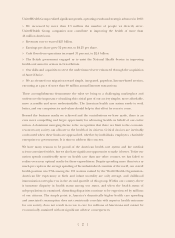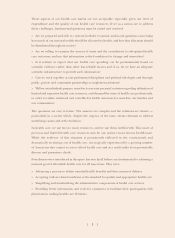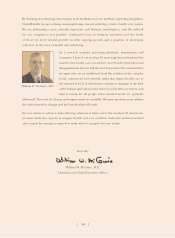United Healthcare 2002 Annual Report Download - page 3
Download and view the complete annual report
Please find page 3 of the 2002 United Healthcare annual report below. You can navigate through the pages in the report by either clicking on the pages listed below, or by using the keyword search tool below to find specific information within the annual report.
UnitedHealth Group realized significant growth, operating results and strategic advances in 2002:
> We increased by more than 2.5 million the number of people we directly serve.
UnitedHealth Group companies now contribute to improving the health of more than
48 million Americans.
> Revenues rose to exceed $25 billion.
> Earnings per share grew 52 percent, to $4.25 per share.
> Cash flows from operations increased 31 percent, to $2.4 billion.
> The British government engaged us to assist the National Health Service in improving
health outcomes for seniors in Great Britain.
> Our skills and capacities to serve the underinsured were enhanced through the acquisition
of AmeriChoice.
> We accelerated our migration toward simple, integrated, paperless, Internet-based services,
executing at a pace of more than 60 million annual Internet transactions.
These accomplishments demonstrate the value we bring to a challenging marketplace and
underscore the importance of making this critical part of our society simpler, more affordable,
more accessible and more understandable. The American health care system needs to work
better, and our competencies and values should help in that effort for years to come.
Beyond the business results we achieved and the contributions we have made, there is an
even more compelling and larger opportunity for advancing health on behalf of our entire
nation. A dominant emerging theme is the recognition that there is a limit to the economic
resources any society can allocate to the health of its citizens. Critical choices are inevitably
confronted when these limits are approached, whether by individuals, employers, charitable
enterprises or governments. It is time to address this concern.
We have many reasons to be proud of the American health care system and the medical
science associated with it, but we also have significant opportunity to make it better. Today our
nation spends considerably more on health care than any other country, yet has failed to
realize even near optimal results for these expenditures. Despite spending more than twice as
much per capita as the average spending of the industrialized countries of the world, our overall
health position was 37th among the 191 nations ranked by the World Health Organization.
American life expectancy at birth and infant mortality are only average, and childhood
immunization rates place us in the second quartile of this group. Within our country, there
is immense disparity in health status among our states, and when the health status of
sub-populations is examined, disturbing disparities continue to be experienced by millions
of our citizens. The simple point is, America’s dramatically higher health care spending
and associated consumption does not consistently correlate with superior health outcomes
for our society, does not result in access to care for millions of Americans and cannot be
economically sustained without significant adverse consequences.
{2}
















